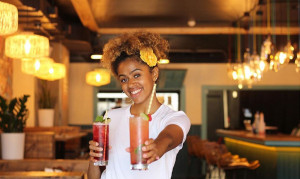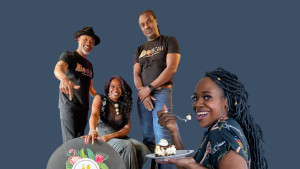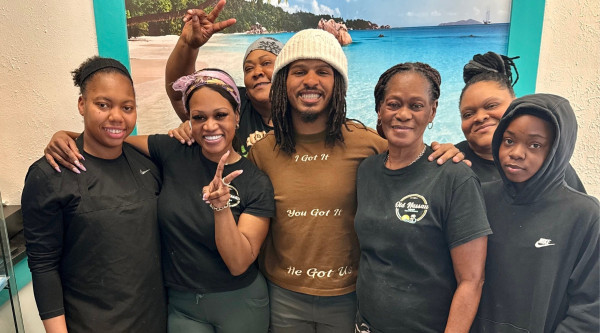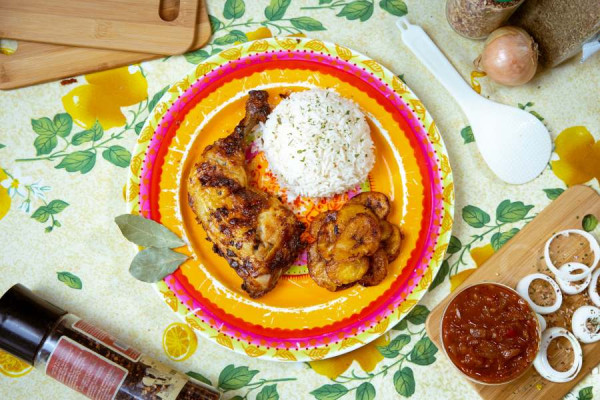When she moved to Toronto as a teenager, she discovered the cornucopia of ethnic flavours the city is famous for. The food culture in both places had a lasting impact on Asha, and she decided she wanted to connect people to food and a community.
In Swahili, kula means to eat, and it’s also the name of Kula Foods, Asha's plant-based food-producing company in Vancouver. The company aims to bring Afro-Caribbean flavours to “plant-forward and plant-curious customers,” leaving them feeling nourished and empowered.
Kula Foods is also one of the five deserving participants that received a $20,000 grant from Pizza Hut’s Equal Slice Program. A program that supports the growth of underrepresented BIPOC business owners through mentorship and education.
What influenced you to become vegan?
I got inspired when I became pregnant with my daughter. I started thinking about how I would nourish myself to nourish her. So, in the first year, I was challenged to think about what kind of food I shouldn't consume. Then I met my husband; some of his family members were vegan, so it was an opportunity for me to get introduced.
Can you tell me about the food culture you experienced growing up in Kenya?
I grew up north of Nairobi on a farm. We lived within a community where we shared our resources, food, and vegetables. As a child, I downloaded that process and the amount of work that went into getting that food to plates. Plant-based food is the most accessible because you’re growing your vegetables. Meat was only consumed on special occasions because it wasn't affordable. It’s very natural; there's not a lot of highly processed food; you know exactly what goes in.
Food is prepared with a lot of intention, so it does take time. We have staples like chapati dough made with three simple ingredients. However, there's a process of learning that If I was to cut corners cooking for my family, everyone's going to know.
What do you think people can gain from trying food from other people’s cultures?
We can't all travel, so being able and willing to open up to food from around the world, it’s rich, like you’ve gained some culture from the flavour. I get so excited when I'm in a new city or just back in Toronto. I will never forget how the food was made with intention there. I went to Chubby’s and had the curry, and every ingredient that was supposed to be there was there. So, for someone like myself to have Japanese, Indian, and Middle Eastern food, there's so much richness that it brings. Even as a diet choice, it's not best for us to consume one kind of food. Also, it's not fun.
I host a series called “Chop It Up” with a friend. It’s an in-person event where we invite chefs in our community from different backgrounds. For example, a recent guest shared how their family made empanadas, which differs from those made in another region. So, what we gained was not just a recipe but their food story. And I think food does tell you a story as history you can access that by trying foods.
Do you think it’s important for people to eat food connected to their ethnic or ancestral roots?
Absolutely. When I moved to Vancouver, I did feel a little lost that first month. I was like, “Well, what will I eat?” I had to produce my food based on what I was used to consuming and what reminded me of home. I was looking for Caribbean food and East and West African cuisine, number one. There's a spiritual connection when consuming food which reminds you of your home or what your ancestors consumed.
You’ve said that you “help customers feel nourished and empowered” can you unpack that?
The choices we make are critical regarding the total value of consuming certain foods; whether you're plant-curious or plant-based, you have plant-based foods once a week—you’ve got to feel nourished. That means, does it make you feel like you feel full? Are you enjoying the food? Are you getting all the nutrients you need? Spiritually, does your soul feel good?
That’s nourished; now, feeling empowered, I truly believe in a physical manifestation. For example, again in Toronto, I walked into a few restaurants that I knew were able to provide food that I love but maybe don't have access to all the time. I felt seen, like this person gets it. I felt seen because it’s an ingredient I can resonate with, and I love to enjoy it whenever it's accessible.
We call our customers our family because they show up for us. We know their names. We want to ensure that there's still some connection if they go into a store and see our products. We hope that they feel seen, they feel loved and nourished. Another thing with nourishment is that there's love involved. It’s attached to our process. We don't rush it; we don't include any ingredients that we think are unnecessary.
{https://www.instagram.com/reel/ChV5ZV1pKor/?utm_source=ig_web_copy_link}
What impact do you think the pandemic or the rise in the cost of living has had on people’s eating habits?
Accessibility comes to mind as a food producer; I'm directly affected by the changes. One of our main ingredients has been so challenging to get. Packages wouldn’t arrive on time, sometimes months later, when you're typically able to receive them within a week. Then the prices doubled. So, the challenge is that you don't want to overprice because we want to give accessibility, and we want more people to try plant-based foods. We want more people to feel like they can afford it; I think that’s important.
I think the issue of food deserts is a discussion that we all need to actively start to think about and think of ways of combating it. It’s already killing certain communities. Last year a film called They’re Trying to Kill Us, talked about African American communities who can’t access nourishing foods, including grocery stores. They can’t just go and buy food within their community; they’re being forced to take transit.
Some of the ways that I'm thinking about things as a food producer is where we're sourcing and looking at as many local options as possible, trying to partner with suppliers, and coming up with a plan. I think the government needs to start implementing additional resources for farmers, local farmers, and food producers and create options for plant-based food producers. Accessibility is key.
What are your thoughts on how climate change is impacting agriculture?
I think we have to make changes now. Perhaps we need to start looking at where the food’s produced, but we still need to remain global.
When it comes to protein, we have an opportunity to get behind plant-based proteins being grown in Canada. Many communities are incorporating more plant-based options, which has a huge impact.
The immediate change we want to see also has to be systemic. That means the government also has to get behind it further. I don't want to put that on just individuals; it involves a larger group.
Every choice has an impact; it doesn’t have to be all doom. The impact I’ve had is that my two children are continuing to live a life with plant-based options. One way we keep food affordable is we incorporate foods like black-eyed peas, lentils, and beans which are pretty accessible. There needs to be some education around what’s currently accessible. There's a whole ecosystem of how we work together.
What are some of the things you learned being part of Pizza Hut’s Equal Slice program?One of the many things the Equal Slice Program has provided me is an opportunity to take a moment and work on my business. As a small business owner and entrepreneur, it's easy to get caught up in the daily grind, especially in the first couple of years. So, one of my big takeaways was planning and taking a moment to step back and assess what's working and what's not. I’ve been able to analyze what my value points are. I know what my values are, but to sit down and write things out, think and talk about them out loud, and share them with folks I've never met before was valuable to me.
One of the other major takeaways is that I felt empowered when one of the speakers talked about capital and looking at the people on a team as human capital. So beyond myself, how do I ensure my team is empowered to do their work and plan for success? So, I've been spending a lot more time with that, and I found that helpful. It was nice to hear what others are up to because we're all coming from different stages in our business, so it was eye-opening to see those experiences.
And personally, being seen is essential; as a woman in a Black-owned business, I'm not necessarily getting the opportunity to have that time to look forward. So, I felt like my business mattered, I felt supported, there was coaching, and I was able to complete a pitch for the first time. But my biggest takeaway is that you don't do this alone; you need the resources and the people behind you and beside you.
I love that there's clarity in what they're looking to support within the program; the program is about supporting BIPOC businesses, specifically Black-owned firms. We need equal opportunities to sustain and surpass the five-year mark as businesses.
What do you plan to do with the $20,000? What will the money allow you to do?
I can't say it enough, but the $20,000 has allowed me to invest in my team's resources. We're using it to have more full-time options available. We can't announce anything yet, but we've had some successful turnaround programs and partnerships. It's also helped us with distribution; that was one of our biggest challenges to scale and expand nationally. This $20,000 has helped us start that; it's very impactful
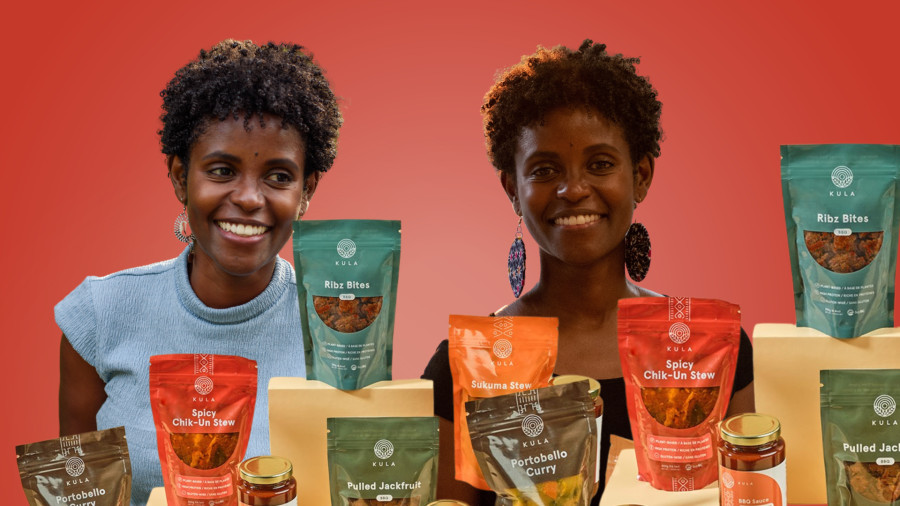
 By
By 




